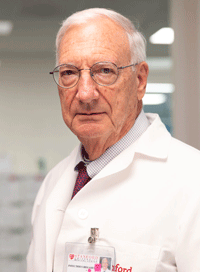 |
Visby Medical sponsors continuing
medical educational events for healthcare professionals across the
country. You can register for upcoming sessions here, or watch archived
webinar recordings at any time, from anywhere. These Visby sponsored events are presented by
key opinion leaders in the world of
healthcare and research, and managed by Whitehat Communications to
ensure a professional environment. All programs are free, and offer P.A.C.E.®
Continuing Education Credits for up to six months after the live event.
Be sure to check back often for new event postings. |
|
|
Importance of Rapid STI Testing for
Sexually Active Adolescent Girls
Live Event: Tuesday, September 27,
2022 | 1:00 PM ET
PACE®
Credit available until March 27, 2023 | Florida Lab
Credit available |
This program has been approved by the
American Association of Critical-Care Nurses (AACN) for 1.00
CERPs, Synergy CERP Category A, File number 24256. Approval
refers to recognition of continuing education only and does not
imply AACN approval or endorsement of the content of this
educational activity, or the products mentioned. |

 |
|
|
|
Adolescents often present with vague symptoms for sexually
transmitted infections (STIs). A majority are underrecognized
and untreated at the time of presentation.1
Also, a large proportion is lost to follow-up.1-2
Underdiagnosis and treatment could lead to adverse patient
outcomes (e.g. birth outcomes, increased risk of HIV
transmission, pelvic inflammatory disease, infertility) and
persistence of infection in sexual networks.
This webinar will discuss testing methods for detecting common
STIs and patient education strategies to reduce recurrence.
1
https://pubmed.ncbi.nlm.nih.gov/25154560/
2
https://www.ncbi.nlm.nih.gov/pmc/articles/PMC4074614/pdf/peds.2011-3326.pdf
This webinar will:
- Review applicable CDC Screening Guidelines for
common STIs in young females
- Examine the importance of sexual health
education for sexually active adolescent girls
- Evaluate effective STI testing methods and
sexual health education strategies
|
|
Presenter:
Maria Trent, MD, MPH, FAAP, FSAHM
Director of Division of Adolescent and Young Adult Medicine
Adolescent Health T32 Training Director
Bloomberg Professor of American Health, Pediatrics, and Nursing,
Johns Hopkins University
Johns Hopkins University

Dr. Trent is a Professor of Pediatrics, American Health, and
Nursing at Johns Hopkins University, Director of the Division of
Adolescent/ Young Adult Medicine, and the Senior Associate Dean
of Diversity and Inclusive Excellence at the Johns Hopkins
University School of Medicine. |
Disentangling Common Vaginal
Infections with Rapid Point-of-Care Testing to Improve Patient
Outcomes
Live Event: Wednesday, August 17,
2022 | 1:00 PM ET
PACE®
Credit available until February 17, 2023 | Florida Lab
Credit available |
This program has been approved by the
American Association of Critical-Care Nurses (AACN) for 1.00
CERPs, Synergy CERP Category A, File number 24230. Approval
refers to recognition of continuing education only and does not
imply AACN approval or endorsement of the content of this
educational activity, or the products mentioned. |

 |
|
|
|
Trichomoniasis is the most common non-viral sexually transmitted
infection1, with an estimated 2.6 million infections annually.
Yet it is underdiagnosed as it is not a reportable disease and
there are no established screening, surveillance, or control
programs in the U.S. Wet mount of vaginal fluid, the most
commonly used diagnostic test for trichomoniasis, has poor
sensitivity.
Trichomoniasis is associated with adverse birth outcomes,
increased risk of HIV acquisition and transmission, cervical
cancer, pelvic inflammatory disease, and infertility. Due to the
limitations of traditional Trichomonas diagnostic methods, women
with this infection may be undertreated. This can lead to
adverse health outcomes, inability to initiate expedited partner
treatment, and persistence of the infection in sexual networks.
In addition to providing updates on epidemiology, clinical
relevance, and treatment recommendations, this webinar examines
the diagnostic challenges associated with Trichomoniasis and
evaluates a modern approach to address this neglected disease.
1 World Health
Organization, Geneva. Global incidence and prevalence of
selected curable sexually transmitted infections - 2008. 2012
doi: 10.1016/s0968-8080(12)40660-7.
This webinar will:
- Distinguish between BV and trichomoniasis in
terms of epidemiology, pathogenesis, and adverse
health outcomes
- Recognize clinical symptoms associated with both
vaginal infections, even while both can be
asymptomatic
- Discuss traditional and novel diagnostic methods
for BV and trichomoniasis
- Illustrate how point-of-care testing could
accurately and rapidly diagnose trichomoniasis,
potentially resulting in improved patient outcomes
|
|
Presenter:
Christina Muzny, MD, MSPH, FACP, FIDSA
Assoc. Prof. of Medicine, Obstetrics/Gynecology, and
Epidemiology
Vice Chair, UAB Institutional Review Board
Department of Medicine | Division of Infectious Diseases
Heersink School of Medicine | University of Alabama at
Birmingham

Dr. Christina Muzny obtained her medical degree at the Texas A&M
University Health Sciences Center College of Medicine. She
subsequently completed an internal medicine residency and an
infectious diseases fellowship at the University of Mississippi
Medical Center prior to joining the infectious diseases faculty
at the University of Alabama at Birmingham (UAB) in 2010. She
has since obtained a Masters of Science in Public Health
(Epidemiology) at the UAB School of Public Health. |
Revolutionizing STI Testing for You
and Your Patients
Live Event: Wednesday, June 29,
2022 | 1:00 PM ET
PACE®
Credit available until December 29, 2022 | Florida Lab
Credit available
|
This program has been approved by the
American Association of Critical-Care Nurses (AACN) for 1.00
CERPs, Synergy CERP Category A, File number 24209. Approval
refers to recognition of continuing education only and does not
imply AACN approval or endorsement of the content of this
educational activity, or the products mentioned. |

 |
|
|
|
Sexually transmitted infection (STI) rates are at all time
highs, and current STI testing takes too long and is not patient
centric. Practices often must treat STIs presumptively while
waiting for results, causing overuse of antibiotics resulting in
patient morbidity and an increase in antibiotic resistance. Once
testing results are available 24-72 hours later, staff must try
to contact the patient, prescribe or change treatment, and spend
additional time documenting.
Adoption of innovative POC STI testing allows for superior
patient care, precise use of antibiotics for treatment, and adds
an opportunity to provide counseling and preventive measures.
Patients benefit from the right treatment for the right problem,
and experience less anxiety and distress. Practices benefit from
the speed and accuracy of testing, which results in staff
efficiency of care and less time charting, allowing for more
patient encounters.
This webinar will:
- Review of the current STI epidemic and impact on
patient health
- Examine how innovative POC testing can increase
efficiency and improved patient care
- Assess how testing accuracy, deployability, and
speed can improve your workflow
- Evaluate how POC STI testing can provide
clinical, operational, and financial benefits to
your practice while increasing both the quality of
care and satisfaction of your patients
|
|
Presenter:
Denise L. Sweeney, MD, FACOG
Associates in Women’s Healthcare
Life Studios Medical Group, CEO

Dr. Denise Sweeney is an ACOG board-certified OB-Gyn
specializing in gynecologic care. While attending USC as an
undergraduate, she developed a love for teaching and outreach to
the under-served surrounding community. This passion continued
into medical school, where she organized medical students to
visit local schools and teach sexual health (sex-ed). |
Don’t Get Tricked by Trichomonas: A
Neglected Sexually Transmitted Infection
Live Event: Thursday, February 24,
2022 | 12:00 PM ET
PACE®
Credit available until August 24, 2022 | Florida Lab
Credit available
|

 |
|
|
|
Trichomoniasis is the most common non-viral sexually transmitted
infection, with an estimated 2.6 million infections annually.
Yet it has long been neglected by clinicians and the general
public as it is not a reportable disease and there are no
established screening, surveillance, or control programs for
women or men in the U.S. Trichomoniasis is associated with
multiple adverse health outcomes in women, including adverse
birth outcomes, increased risk of HIV acquisition and
transmission, cervical cancer, pelvic inflammatory disease, and
infertility. It is commonly under-diagnosed as the poorly
sensitive wet mount of vaginal fluid has traditionally been used
as the most common diagnostic test in women.
Due to the challenges of traditional Trichomonas diagnostic
methods, women with this infection may be undertreated. This can
lead to adverse health outcomes, inability to initiate expedited
partner treatment, and persistence of the infection in sexual
networks. In addition to providing updates on epidemiology,
clinical relevance, and treatment recommendations, this webinar
examines the diagnostic challenges associated with
Trichomoniasis and evaluates a modern approach to outsmart this
neglected STI.
This webinar will:
- Review Trichomoniasis epidemiology – US and
worldwide
- Examine adverse health outcomes for women
- Examine Trichomonas diagnosis and the associated
challenges
- Review issues surrounding drug resistance
- Review patient management including
the 2021 CDC guidelines for Trichomonas testing &
treatment
- Evaluate a modern approach to outsmart
Trichomonas
|
|
Presenter:
Christina Muzny, MD, MSPH, FACP, FIDSA
Assoc. Prof. of Medicine, Obstetrics/Gynecology, and
Epidemiology
Vice Chair, UAB Institutional Review Board
Department of Medicine | Division of Infectious Diseases
Heersink School of Medicine | University of Alabama at
Birmingham

Dr. Christina Muzny obtained her medical degree at the Texas A&M
University Health Sciences Center College of Medicine. She
subsequently completed an internal medicine residency and an
infectious diseases fellowship at the University of Mississippi
Medical Center prior to joining the infectious diseases faculty
at the University of Alabama at Birmingham (UAB) in 2010. She
has since obtained a Masters of Science in Public Health
(Epidemiology) at the UAB School of Public Health. |
Improving Antimicrobial Stewardship
in Sexually Transmitted Infections
Live Event: Wednesday, December 8,
2021 | 11:00 AM ET
PACE®
Credit available until June 8, 2022 | Florida Lab
Credit available
|

 |
|
|
|
|
Traditional molecular PCR testing
requires a large analyzer in a central laboratory, supplied with
reagents or cartridges and operated by skilled lab
professionals. For highly accurate and reliable diagnostic
results, the healthcare professional has had only two choices:
• Send
the collected patient sample to a central/remote PCR lab for
batch processing, with turnaround time from hours to days, or
• Invest in point-of-care instrumentation that can
bring the test closer, but with instrument bottlenecks, downtime
and ongoing expenses for maintenance, calibration and
cartridges.
This problem means patients may not get
the treatment or the right treatment - which often leads to
unnecessary use of antibiotics and antimicrobial resistance,
expedited partner treatment cannot be initiated, and patients
are often lost to follow-up. When patients leave without the
right treatment, the infection continues to spread in them and
possibly to their partner(s) and throughout the community.
This webinar will present the 2021 CDC STI guidelines, dive into
the challenges with traditional STI testing and the impact on
antibiotic stewardship and review what is needed to combat the
growing number of antibiotic resistant STI.
This webinar will:
- Review 2021 CDC STI Guidelines
- Examine key challenges with STI testing today at
clinical settings such as Urgent Care and Emergency
Dept / Hospital including patients lost to follow
up, implications of overtreatment / undertreatment
of STI
- Evaluate the implications of today’s STI testing
to Antibiotic Stewardship
- Review STI point of care testing to combat the
growing number of antibiotic resistant sexually
transmitted infections
|
|
Presenter:
Glenn Harnett, MD, FCUCM, CEO
No Resistance Consulting Group

Dr. Harnett has over 20 years of experience as a "boots on the
ground" clinician, spending 10 years practicing emergency
medicine before establishing himself as a nationally respected
urgent care physician and key opinion leader. After five years
as the Chief Medical Officer for American Family Care while they
grew from 17 to 185 clinics, he founded No Resistance Consulting
Group in 2016 which focuses on clinical trial site management
and recruitment for a growing network of high volume,
geographically diverse, urgent care, and multi-specialty trial
sites. Dr. Harnett has been an active author and researcher -
designing trials, writing trial protocols, and acting as a
principal investigator for numerous clinical trials conducted in
the urgent care setting. |
Advances in PCR for POCT to Address
the Sexually Transmitted Infection Epidemic
Live Event: Tuesday, October 5,
2021
PACE®
Credit available until April 5, 2022 | Florida Lab
Credit available
|

 |
|
|
|
The most recent CDC report on STI surveillance showed that rates
of chlamydia and gonorrhea in the US were at a 20-year high in
2019 for the sixth consecutive year. STIs affect everyone.
Untreated STIs cost our society billions of dollars a year yet
are largely preventable. Traditional STI testing doesn’t provide
an accurate result soon enough for a results-driven diagnosis
during the patient visit, so clinicians prescribe STI treatments
before they have a clear diagnosis. This can lead to delayed or
ineffective treatment for the patient, and to the emergence of
antibiotic resistant microbes.
Adopting rapid PCR at the POC would enable clinicians to have a
productive discussion with the patient during the visit to help
increase treatment adherence and also to reduce the number of
patients who are often lost to follow-up when they leave without
the right treatment. This can reduce the spread of infection in
patients, their partner(s) and stop transmission throughout the
community.
This webinar will present recent advances in nucleic acid
amplification testing (NAAT) methodology, and instrument-free
single-use PCR (polymerase chain reaction) in particular, that
provides both accuracy and speed of results at the point of
care. Such advancements for STI enables clinicians to make
results-driven diagnoses for correct treatment, all while the
patient is still at the clinic visit, for a more focused
clinician-patient dialogue and ‘teachable moment’.
This webinar will:
- Review the rising rates of Sexually Transmitted
Infections (STI)
- Analyze today’s STI testing methods
- Discuss the challenges and implications of
today’s testing methods for the patient, clinician,
and public health
- Examine the criteria for POC testing that could
improve patient and clinician satisfaction scores
and positively impact STI rates
|
|
Presenter:
Gary Schoolnik, MD
Professor of Medicine, Stanford University
Chief Medical Officer, Visby Medical

Dr. Schoolnik received his M.D. degree and infectious diseases
subspecialty training at the University of Washington in
Seattle, served as medical intern, resident and chief resident
at Harvard’s Massachusetts General Hospital in Boston and he was
a research associate and associate physician at the Rockefeller
University in Manhattan. While on the Stanford Medical School
faculty he served as Chief of the Division of Infectious
Diseases and Geographic Medicine. National service included his
appointment to the Advisory Council of the National Institutes
of Allergy and Infectious Diseases of the NIH and his role as
chair of the NIH Trans-Institute Committee on the Human
Microbiome and co-chair of the NIH Blue Ribbon Committee on
Bioterrorism.
|
|
These webinars are sponsored by |
 |
|
|
© 2021 | Whitehat
Communications, a division of Martek Inc. |
|







